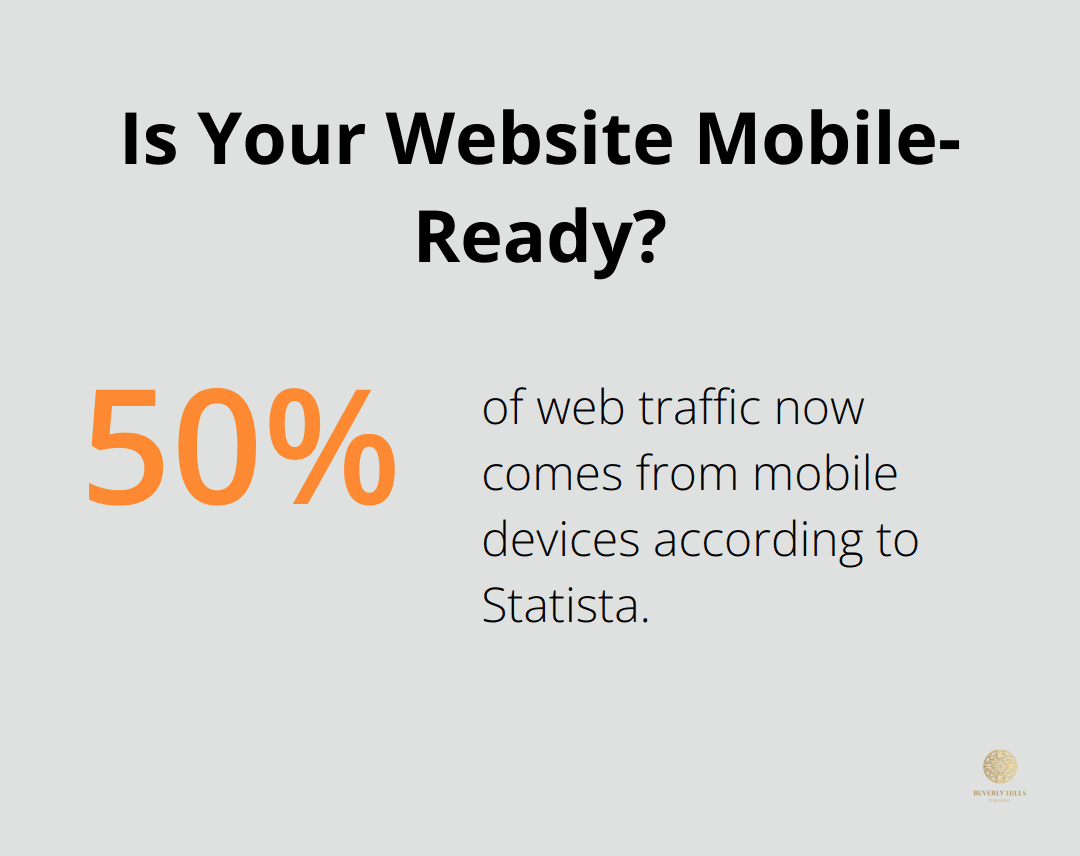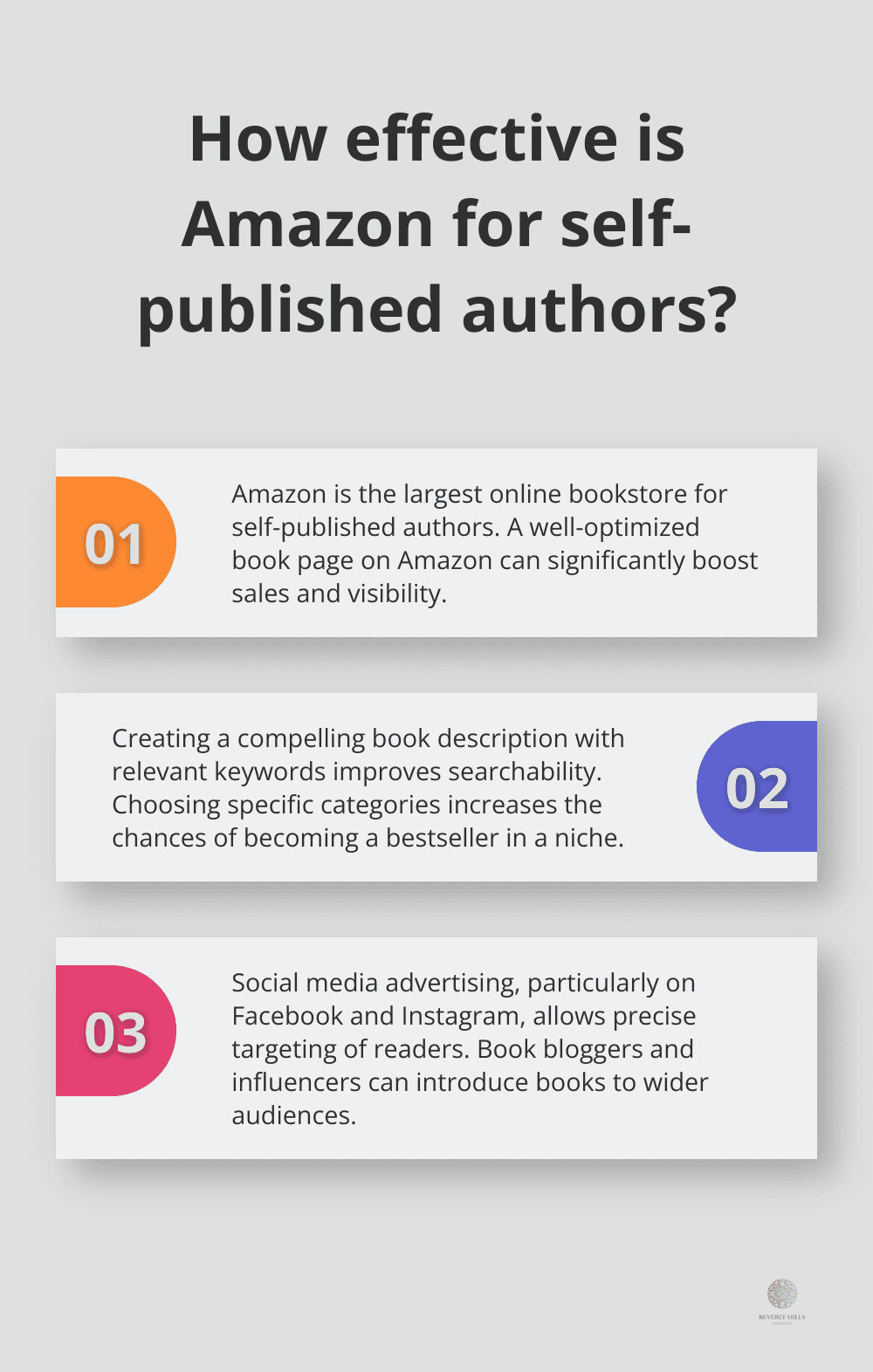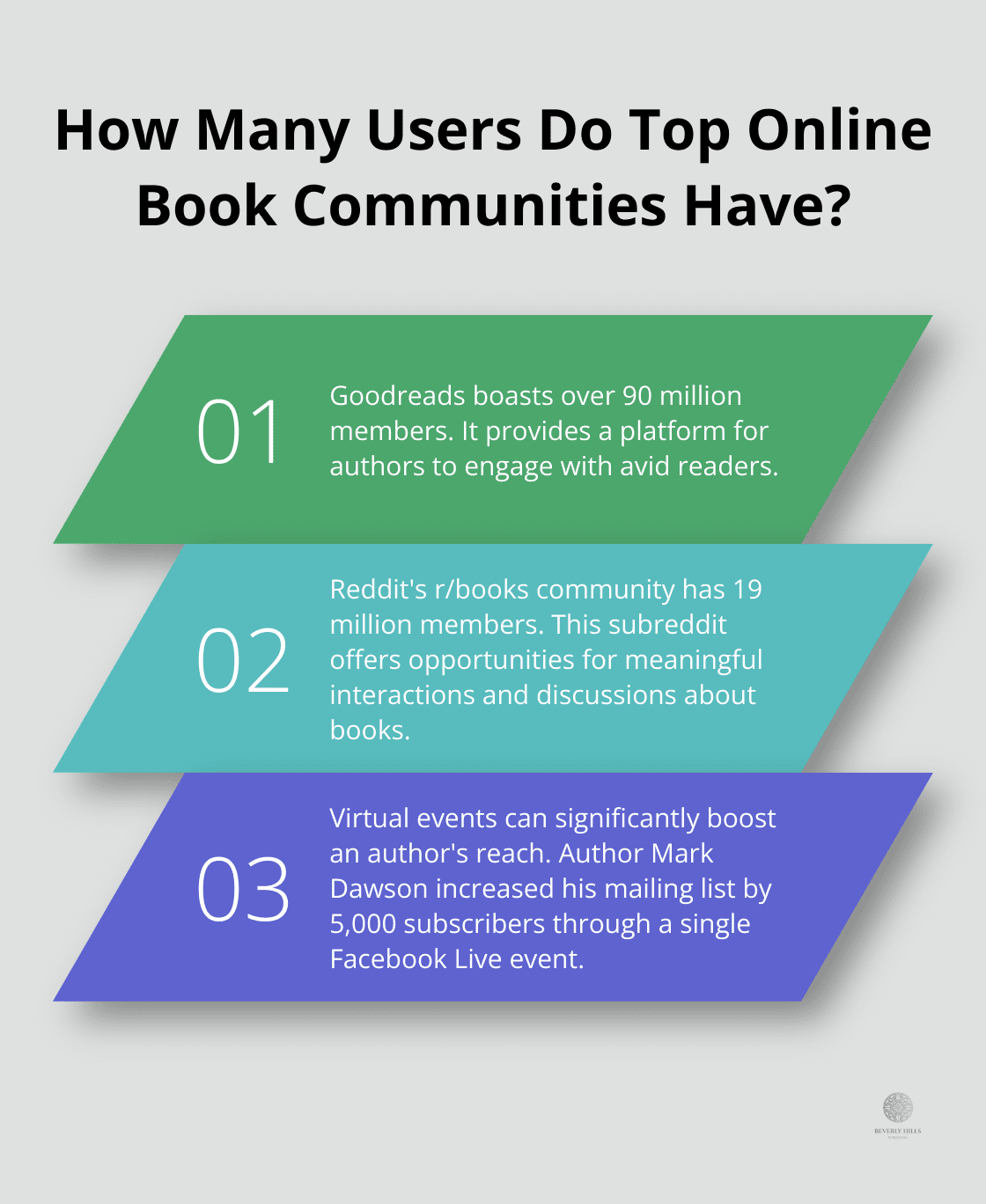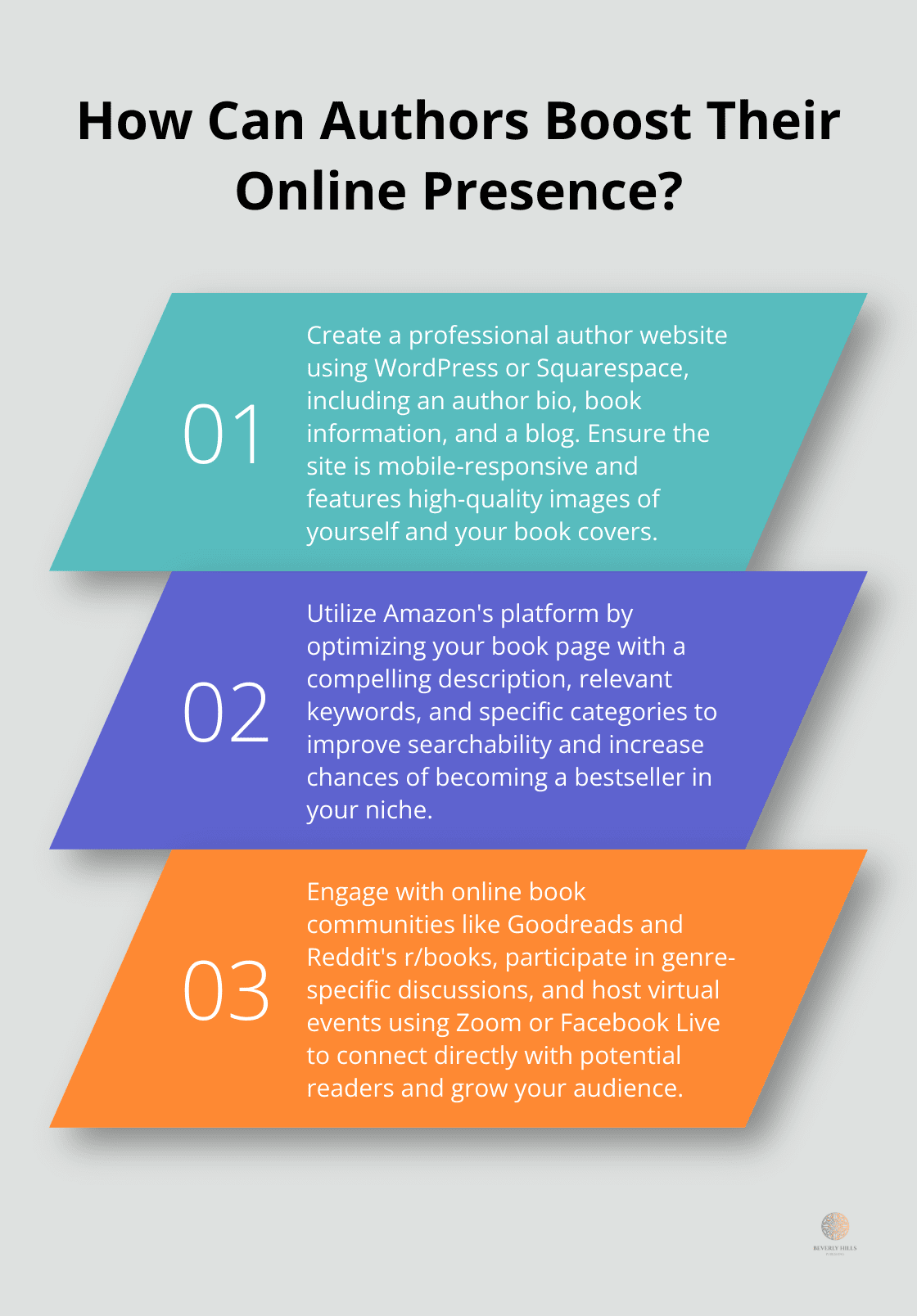At Beverly Hills Publishing, we understand the challenges of marketing a self-published book. Many authors struggle to get their work noticed in a crowded marketplace.
Effective marketing can make the difference between obscurity and success. This guide will provide you with practical strategies to promote your book and reach your target audience, including tips on leveraging our self-published book marketing services.
Building Your Author Brand
Craft Your Author Website
An author website serves as your digital home base. It’s where readers, media, and industry professionals learn about you and your work. Choose a domain name that reflects your author brand, ideally your full name. Use a user-friendly website builder like WordPress or Squarespace to create a professional-looking site without excessive costs.

Include key elements such as an author bio, book information, a blog, and contact details on your website. Ensure your site is mobile-responsive, as over 50% of web traffic now comes from mobile devices (according to Statista). Add high-quality images of yourself and your book covers to create a visually appealing experience for visitors.
Harness Social Media Power
Social media platforms offer invaluable opportunities to connect with readers and fellow authors. Focus on one or two platforms where your target audience is most active. Fiction authors often see great results on Instagram and TikTok, while non-fiction writers might find more traction on LinkedIn or Twitter.
Consistency is key in social media marketing. Post regularly, share insights into your writing process, snippets of your work, and engage with your followers. Sprout Social found that nearly three-quarters of consumers expect a response on social within 24 hours.
Nurture Your Email List
Email marketing remains one of the most effective ways to reach your audience directly. Start building your list early (even before your book is published). Offer incentives like free short stories, exclusive content, or early access to new releases to encourage sign-ups.
Use email marketing platforms (such as Mailchimp or ConvertKit) to manage your list and create professional-looking newsletters. These tools often provide analytics that can help you understand what content resonates most with your readers.
Develop a Consistent Brand Voice
Your author brand should have a consistent voice across all platforms. This voice should reflect your personality and writing style, making it easier for readers to connect with you. Try to maintain this consistency in your social media posts, website content, and email communications.
Leverage Professional Services
Consider using professional services to enhance your author brand. Beverly Hills Publishing™, for example, offers integrated publishing, branding, and marketing services that can help establish you as a leading authority in your industry. Their approach combines groundbreaking publishing with strategic branding, propelling authors beyond traditional publishing and elevating their visibility in the market.
As you build your author brand, you’ll create a solid foundation for your book marketing efforts. The next step is to explore effective online marketing strategies that will help you reach a wider audience and boost your book sales.
Mastering Online Book Marketing
Online marketing is essential for self-published authors in today’s digital age. Effective online strategies can significantly boost book sales and author visibility. Here’s how you can leverage the power of online platforms to market your self-published book effectively.
Optimize Your Amazon Presence
Amazon, the largest online bookstore, requires a well-optimized book page. Create a compelling book description that hooks readers in the first few sentences. Use relevant keywords throughout your description to improve searchability. Choose the most specific categories for your book to increase its chances of becoming a bestseller in its niche.
Harness the Power of Social Media Advertising
Social media advertising allows you to reach your target audience with precision. Facebook and Instagram ads are particularly effective for books, with the ability to target users based on interests, demographics, and even reading habits.

Start with a small budget and test different ad formats. Video ads tend to perform well on social media platforms.
Collaborate with Book Bloggers and Influencers
Book bloggers and social media influencers can introduce your book to a wider audience. Research bloggers and influencers in your genre and reach out with personalized pitches. Offer free copies of your book in exchange for honest reviews.
Utilize Book Promotion Sites
Book promotion sites like BookBub and Bargain Booksy can give your book a significant boost in visibility. These sites have large subscriber bases of avid readers looking for new books. While some of these services require a fee, they can result in substantial increases in downloads and sales.
Engage in Content Marketing
Create engaging content that extends beyond book promotion. This can include blog posts, videos, or podcasts. Share your expertise and insights to attract potential readers and establish yourself as an authority in your field.
Try to post consistently and promote your content across various channels. This approach not only attracts readers but also improves your search engine rankings, making it easier for potential fans to find you and your book.
As you implement these online marketing strategies, you’ll notice an increase in your book’s visibility and reach. The next step is to focus on engaging directly with your target audience, which we’ll explore in the following section.
Connecting with Your Readers
Join Online Book Communities
Online book communities offer authors opportunities to engage with avid readers. Goodreads (with over 90 million members) and Reddit’s r/books community (boasting 19 million members) provide platforms for meaningful interactions. Join groups related to your genre and participate in discussions. Share your insights, recommend books, and build genuine relationships with potential readers.
Host Virtual Events
Virtual events provide a cost-effective way to reach readers globally. Use platforms like Zoom or Facebook Live to host book launch parties, Q&A sessions, or writing workshops. Author Mark Dawson increased his mailing list by 5,000 subscribers through a single Facebook Live event where he discussed his writing process and answered reader questions. This direct interaction boosted his subscriber count and led to increased book sales.
Offer Exclusive Content
Free, exclusive content attracts new readers and keeps existing ones engaged. This content can include short stories, character backstories, or deleted scenes from your books. Author Hugh Howey (known for his self-published Wool series) regularly shares free short stories set in his book’s universe. This strategy helps him maintain reader interest between book releases and attract new readers to his series.
Create a Reader-Centric Newsletter
A newsletter focused on your readers’ interests (rather than just promoting your books) can foster a strong connection. Include behind-the-scenes glimpses of your writing process, book recommendations (beyond your own works), and exclusive content. Try to make your newsletter a valuable resource that subscribers look forward to receiving.
Engage on Social Media
Social media platforms allow for direct, real-time interaction with your readers. Respond to comments, ask questions, and create polls to involve your audience in your writing journey. Share snippets of your work-in-progress or ask for input on character names. This level of engagement makes readers feel invested in your work and more likely to support your future releases.

Final Thoughts
Marketing a self-published book requires a multi-faceted approach that combines digital strategies with personal engagement. Authors must develop a strong platform, leverage online marketing tools, and connect directly with readers to increase their book’s visibility and sales potential. Consistency and persistence play vital roles in successful book marketing, as building an audience and establishing an author brand takes time and effort.

The publishing landscape continues to evolve, making it essential for authors to stay informed about new marketing trends and technologies. Authors should educate themselves about emerging platforms, tools, and strategies that can help them reach their target audience more effectively. Attending writing conferences, participating in author forums, and networking with fellow writers will help authors stay updated on industry developments.
At Beverly Hills Publishing, we understand the challenges of marketing self-published books. Our self-published book marketing services are designed to help authors navigate the complex world of book promotion. We combine innovative publishing techniques with strategic branding and marketing to elevate authors beyond traditional publishing (establishing them as leading authorities in their industries).















































































































































































































































